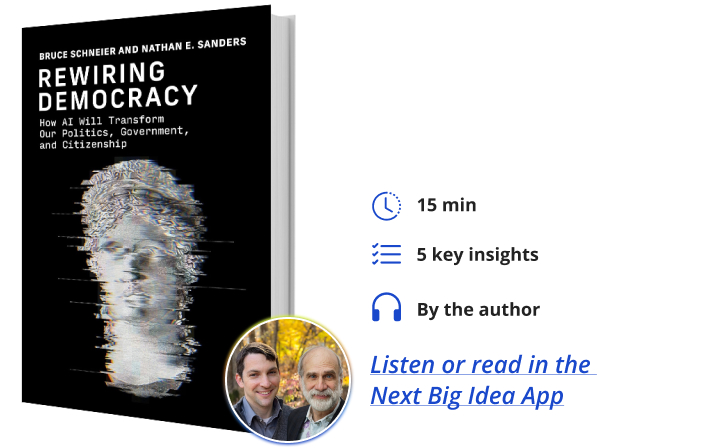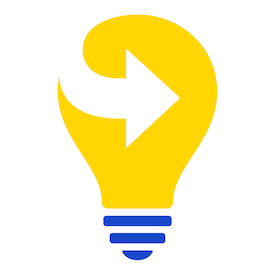Below, co-authors Bruce Schneier and Nathan Sanders share five key insights from their new book, Rewiring Democracy: How AI Will Transform Our Politics, Government, and Citizenship.
Bruce is a security technologist, teaching at the Harvard Kennedy School and the Munk School at the University of Toronto. He is also a board member of the Electronic Frontier Foundation and Chief of Security Architecture at Inrupt, Inc.
Nathan is a data scientist affiliated with Harvard’s Berkman Klein Center. He is focused on making policymaking more participatory, with his research spanning machine learning, astrophysics, public health, environmental justice, and more.
What’s the big idea?
AI can be used both for and against the public interest within democracies. It is already being used in the governing of nations around the world, and there is no escaping its continued use in the future by leaders, policy makers, and legal enforcers. How we wire AI into democracy today will determine if it becomes a tool of oppression or empowerment.

1. AI’s global democratic impact is already profound.
It’s been just a few years since ChatGPT stormed into view and AI’s influence has already permeated every democratic process in governments around the world:
- In 2022, an artist collective in Denmark founded the world’s first political party committed to an AI-generated policy platform.
- Also in 2022, South Korean politicians running for the presidency were the first to use AI avatars to communicate with voters en masse.
- In 2023, a Brazilian municipal legislator passed the first enacted law written by AI.
- In 2024, a U.S. federal court judge started using AI to interpret the plain meaning of words in U.S. law.
- Also in 2024, the Biden administration disclosed more than two thousand discrete use cases for AI across the agencies of the U.S. federal government.
The examples illustrate the diverse uses of AI across citizenship, politics, legislation, the judiciary, and executive administration.
Not all of these uses will create lasting change. Some of these will be one-offs. Some are inherently small in scale. Some were publicity stunts. But each use case speaks to a shifting balance of supply and demand that AI will increasingly mediate.
Legislators need assistance drafting bills and have limited staff resources, especially at the local and state level. Historically, they have looked to lobbyists and interest groups for help. Increasingly, it’s just as easy for them to use an AI tool.
2. The first places AI will be used are where there is the least public oversight.
Many of the use cases for AI in governance and politics have vocal objectors. Some make us uncomfortable, especially in the hands of authoritarians or ideological extremists.
In some cases, politics will be a regulating force to prevent dangerous uses of AI. Massachusetts has banned the use of AI face recognition in law enforcement because of real concerns voiced by the public about their tendency to encode systems of racial bias.
Some of the uses we think might be most impactful are unlikely to be adopted fast because of legitimate concern about their potential to make mistakes, introduce bias, or subvert human agency. AIs could be assistive tools for citizens, acting as their voting proxies to help us weigh in on larger numbers of more complex ballot initiatives, but we know that many will object to anything that verges on AIs being given a vote.
“It’s likely that even the thousands of disclosed AI uses in government are only the tip of the iceberg.”
But AI will continue to be rapidly adopted in some aspects of democracy, regardless of how the public feels. People within democracies, even those in government jobs, often have great independence. They don’t have to ask anyone if it’s ok to use AI, and they will use it if they see that it benefits them. The Brazilian city councilor who used AI to draft a bill did not ask for anyone’s permission. The U.S. federal judge who used AI to help him interpret law did not have to check with anyone first. And the Trump administration seems to be using AI for everything from drafting tariff policies to writing public health reports—with some obvious drawbacks.
It’s likely that even the thousands of disclosed AI uses in government are only the tip of the iceberg. These are just the applications that governments have seen fit to share; the ones they think are the best vetted, most likely to persist, or maybe the least controversial to disclose.
3. Elites and authoritarians will use AI to concentrate power.
Many Westerners point to China as a cautionary tale of how AI could empower autocracy, but the reality is that AI provides structural advantages to entrenched power in democratic governments, too. The nature of automation is that it gives those at the top of a power structure more control over the actions taken at its lower levels.
It’s famously hard for newly elected leaders to exert their will over the many layers of human bureaucracies. The civil service is large, unwieldy, and messy. But it’s trivial for an executive to change the parameters and instructions of an AI model being used to automate the systems of government.
The dynamic of AI effectuating concentration of power extends beyond government agencies.
Over the past five years, Ohio has undertaken a project to do a wholesale revision of its administrative code using AI. The leaders of that project framed it in terms of efficiency and good governance: deleting millions of words of outdated, unnecessary, or redundant language. The same technology could be applied to advance more ideological ends, like purging all statutory language that places burdens on business, neglects to hold businesses accountable, protects some class of people, or fails to protect others.
Whether you like or despise automating the enactment of those policies will depend on whether you stand with or are opposed to those in power, and that’s the point. AI gives any faction with power the potential to exert more control over the levers of government.
4. Organizers will find ways to use AI to distribute power instead.
We don’t have to resign ourselves to a world where AI makes the rich richer and the elite more powerful. This is a technology that can also be wielded by outsiders to help level the playing field.
In politics, AI gives upstart and local candidates access to skills and the ability to do work on a scale that used to only be available to well-funded campaigns. In the 2024 cycle, Congressional candidates running against incumbents like Glenn Cook in Georgia and Shamaine Daniels in Pennsylvania used AI to help themselves be everywhere all at once. They used AI to make personalized robocalls to voters, write frequent blog posts, and even generate podcasts in the candidate’s voice. In Japan, a candidate for Governor of Tokyo used an AI avatar to respond to more than eight thousand online questions from voters.
“We don’t have to resign ourselves to a world where AI makes the rich richer and the elite more powerful.”
Outside of public politics, labor organizers are also leveraging AI to build power. The Worker’s Lab is a U.S. nonprofit developing assistive technologies for labor unions, like AI-enabled apps that help service workers report workplace safety violations. The 2023 Writers’ Guild of America strike serves as a blueprint for organizers. They won concessions from Hollywood studios that protect their members against being displaced by AI while also winning them guarantees for being able to use AI as assistive tools to their own benefit.
5. The ultimate democratic impact of AI depends on us.
If you are excited about AI and see the potential for it to make life, and maybe even democracy, better around the world, recognize that there are a lot of people who don’t feel the same way.
If you are disturbed about the ways you see AI being used and worried about the future that leads to, recognize that the trajectory we’re on now is not the only one available.
The technology of AI itself does not pose an inherent threat to citizens, workers, and the public interest. Like other democratic technologies—voting processes, legislative districts, judicial review—its impacts will depend on how it’s developed, who controls it, and how it’s used.
Constituents of democracies should do four things:
- Reform the technology ecosystem to be more trustworthy, so that AI is developed with more transparency, more guardrails around exploitative use of data, and public oversight.
- Resist inappropriate uses of AI in government and politics, like facial recognition technologies that automate surveillance and encode inequity.
- Responsibly use AI in government where it can help improve outcomes, like making government more accessible to people through translation and speeding up administrative decision processes.
- Renovate the systems of government vulnerable to the disruptive potential of AI’s superhuman capabilities, like political advertising rules that never anticipated deepfakes.
These four Rs are how we can rewire our democracy in a way that applies AI to truly benefit the public interest.
Enjoy our full library of Book Bites—read by the authors!—in the Next Big Idea App:
































